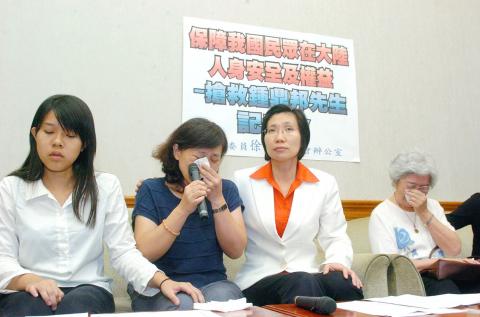The family of Bruce Chung (鍾鼎邦) pleaded with the government for the second time in 10 days to do something about his detention in China.
Chung, a 53-year-old Falun Gong practitioner, was arrested in Ganzhou, Jiangxi Province, on June 18 as he was about to return to Taiwan and accused of “sabotaging national and public security.”
“We do not want to wait for another minute or another second because his life is at stake,” Chung Ai (鍾愛), Chung Ting-pang’s daughter, told a press conference in Taipei organized by Chinese Nationalist Party (KMT) Legislator Hsu Hsin-ying (徐欣瑩).

Photo: Wang Min-wei, Taipei Times
This was the second press conference the family has called after making the same appeal with Democratic Progressive Party (DPP) lawmakers on June 22.
The family has had no contact with Chung Ting-pang since his arrest or been provided with any further details about the case since the first press conference in which they urged the government to help, Chung Ai said.
Hsu made three demands: the immediate return of Chung Ting-pang to Taiwan, the assistance of the Straits Exchange Foundation (SEF) in hiring a lawyer to defend Chung Ting-pang, the arrangement of a family visit and a discussion on how to protect Taiwanese from harassment in China in upcoming cross-strait negotiations.
“We have to make sure that Taiwanese are legally protected before engaging in broader cross-strait exchanges,” the lawmaker said.
Chung Ting-pang’s wife, surname Lee (李), was in tears at the conference, saying the government was the only channel available to the family to seek the return of her husband.
Officials from the SEF, the Mainland Affairs Council and the Ministry of Justice attended the press conference, said they had been in contact with their Chinese counterpart since the arrest and were assured that Chung Ting-pang was safe.
Yu Shiu-duan (俞秀端), deputy director-general of the ministry’s department of International and Cross-Strait Legal Affairs, said officials in the Chinese Ministry of Public Safety had given assurances that Chung Ting-pang was safe and well, but provided no further details as to his arrest.
A report last Tuesday from China’s Xinhua news agency said that Chung Ting-pang had secretly collected documents and incited Chinese citizen’s to destroy broadcasting equipment — crimes which endangered national and public safety.
Chung Ting-pang’s background as a practitioner of Falun Gong, which is banned in China, was not mentioned at the press conference.
According to Chung Ai, her family has been struggling with whether to draw attention to Chung Ting-pang’s Falun Gong practice, which government officials suggested would only “complicate the case.”
In contrast, Falun Gong Human Rights Lawyers Working Group spokesperson attorney Teresa Chu (朱婉琪) advised Chung Ting-pang’s family that his Falun Gong background could be used to pressure Beijing.
Between 1998 and 2009, 13 Taiwanese Falun Gong practitioners have been detained, imprisoned or tortured in China, Chu said, though they had all been released.

The US government has signed defense cooperation agreements with Japan and the Philippines to boost the deterrence capabilities of countries in the first island chain, a report by the National Security Bureau (NSB) showed. The main countries on the first island chain include the two nations and Taiwan. The bureau is to present the report at a meeting of the legislature’s Foreign Affairs and National Defense Committee tomorrow. The US military has deployed Typhon missile systems to Japan’s Yamaguchi Prefecture and Zambales province in the Philippines during their joint military exercises. It has also installed NMESIS anti-ship systems in Japan’s Okinawa

‘WIN-WIN’: The Philippines, and central and eastern European countries are important potential drone cooperation partners, Minister of Foreign Affairs Lin Chia-lung said Minister of Foreign Affairs Lin Chia-lung (林佳龍) in an interview published yesterday confirmed that there are joint ventures between Taiwan and Poland in the drone industry. Lin made the remark in an exclusive interview with the Chinese-language Liberty Times (the Taipei Times’ sister paper). The government-backed Taiwan Excellence Drone International Business Opportunities Alliance and the Polish Chamber of Unmanned Systems on Wednesday last week signed a memorandum of understanding in Poland to develop a “non-China” supply chain for drones and work together on key technologies. Asked if Taiwan prioritized Poland among central and eastern European countries in drone collaboration, Lin

Renewed border fighting between Thailand and Cambodia showed no signs of abating yesterday, leaving hundreds of thousands of displaced people in both countries living in strained conditions as more flooded into temporary shelters. Reporters on the Thai side of the border heard sounds of outgoing, indirect fire yesterday. About 400,000 people have been evacuated from affected areas in Thailand and about 700 schools closed while fighting was ongoing in four border provinces, said Thai Rear Admiral Surasant Kongsiri, a spokesman for the military. Cambodia evacuated more than 127,000 villagers and closed hundreds of schools, the Thai Ministry of Defense said. Thailand’s military announced that

CABINET APPROVAL: People seeking assisted reproduction must be assessed to determine whether they would be adequate parents, the planned changes say Proposed amendments to the Assisted Reproduction Act (人工生殖法) advanced yesterday by the Executive Yuan would grant married lesbian couples and single women access to legal assisted reproductive services. The proposed revisions are “based on the fundamental principle of respecting women’s reproductive autonomy,” Cabinet spokesperson Michelle Lee (李慧芝) quoted Vice Premier Cheng Li-chiun (鄭麗君), who presided over a Cabinet meeting earlier yesterday, as saying at the briefing. The draft amendment would be submitted to the legislature for review. The Ministry of Health and Welfare, which proposed the amendments, said that experts on children’s rights, gender equality, law and medicine attended cross-disciplinary meetings, adding that